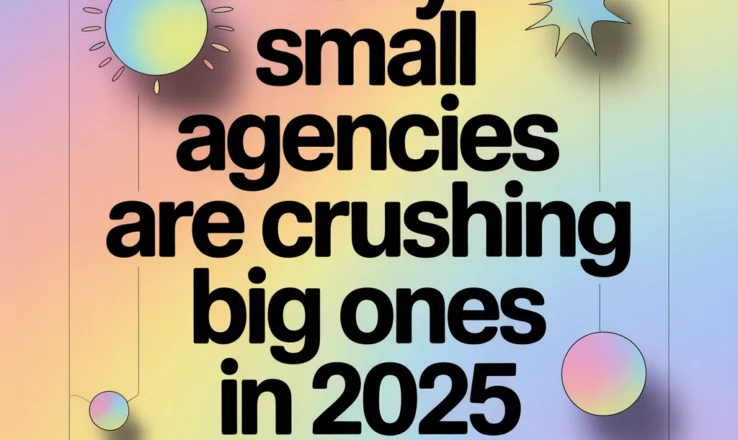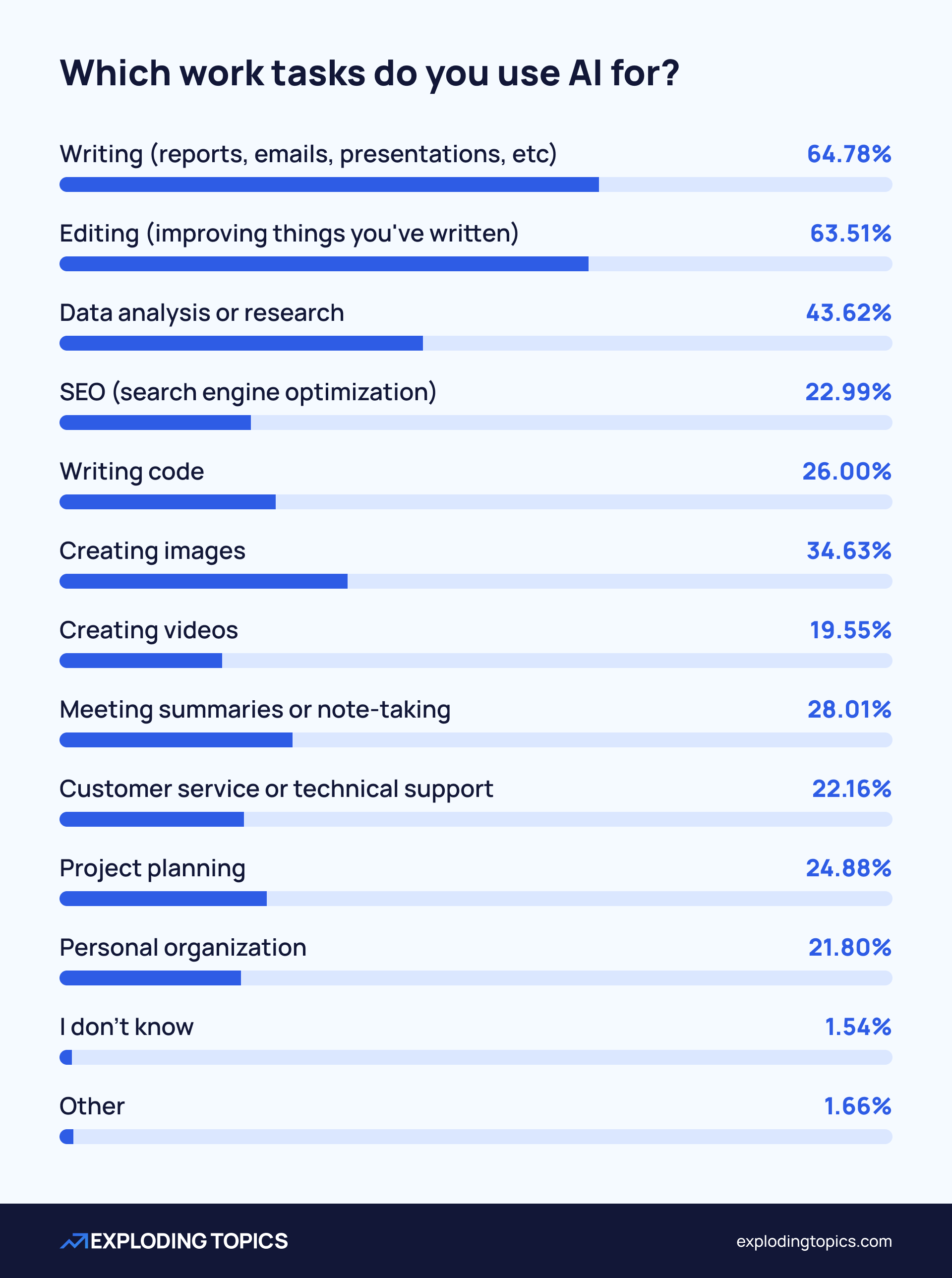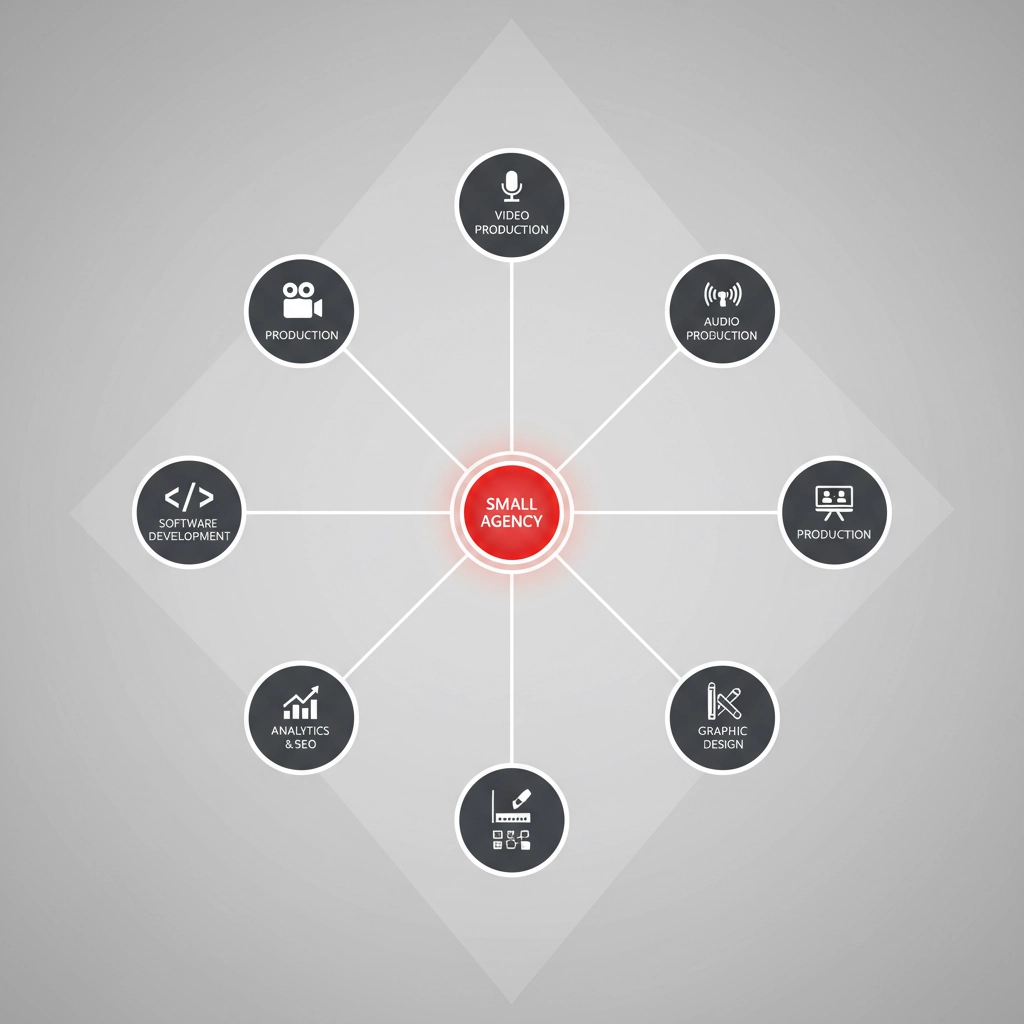
Here's what's happening right now: small agencies are absolutely demolishing their larger competitors in 2025. I'm talking about boutique shops generating over $220,000 in monthly net profit while working with fewer clients and offering fewer services than the big players.
This isn't some feel-good story about David beating Goliath.
This is a fundamental shift in how businesses buy marketing services, and if you're running a small agency, you need to understand these dynamics and capitalize on them immediately.
Let me walk you through exactly why this is happening and give you the specific playbook to dominate in your market.
The Specialization Advantage: Your Secret Weapon
Stop trying to be everything to everyone.
Right now, the most successful small agencies are those that have embraced hyper-specialization, and I mean radical focus on tiny but underserved market niches.
Here's your first action item: Pick one specific type of business and become the absolute best at serving them. Not "B2B companies" or "e-commerce brands." I'm talking about "SaaS companies in healthcare with 50-200 employees" or "family-owned restaurants in mid-sized cities looking to compete with chains."
This specialization allows you to command premium pricing because you're not competing on breadth, you're competing on depth of expertise. When a prospect finds an agency that understands their exact challenges and speaks their language, price becomes secondary.
Your homework: Audit your current client base. What industries, company sizes, or business models show up repeatedly? That's your specialization goldmine. Double down on that sector and start saying no to everything else.
Speed Kills (The Competition)
Large agencies are bureaucratic nightmares. Your prospect emails them on Monday, it gets passed through three account managers, two strategists, and a creative director before anyone can make a decision by Friday. Meanwhile, you're responding with strategic recommendations within hours.

This speed advantage isn't just about response time, it's about strategic agility. When market conditions shift, when a campaign needs pivoting, when a client has an urgent request, you can move while big agencies are still scheduling meetings to discuss scheduling meetings.
Here's how to weaponize this: Set up systems that allow you to respond to client requests within 24 hours maximum. Create template processes for common strategic decisions. Most importantly, give your team the authority to make decisions without checking with you on every detail.
The data backs this up: agencies that quickly respond to market demands grow faster, and smaller, nimble agencies are naturally better positioned to capitalize on these opportunities.
Direct Access Is Your Competitive Moat
When clients work with big agencies, they're talking to account coordinators who report to account managers who report to account directors who maybe have access to the people making strategic decisions. With your agency, they're talking directly to you or your senior strategists.
This isn't just about ego, it's about strategic effectiveness. Direct access means faster approvals, clearer communication, and strategies that actually align with the client's vision instead of getting diluted through multiple layers of telephone.

Make this a core part of your positioning: "When you work with us, you work directly with the strategists developing your campaigns, not junior account managers reading from scripts." Prospects will pay premium rates for this access because they've been burned by the big agency runaround before.
The Economics Are on Your Side
Small agencies typically operate with 30-40% lower overhead than large agencies. You don't have layers of middle management, expensive office spaces in prime real estate, or shareholders demanding quarterly growth at any cost.
This economic advantage allows you to offer flexible pricing that large agencies simply cannot match. While they're requiring 12-month contracts with six-figure minimums, you can offer project-based work, pilot programs, and flexible payment terms.
But here's the key: don't compete on price alone. Use your cost advantage to reinvest in better service, better tools, and better talent. The goal is to offer comparable or superior value at a more accessible price point, not to be the cheapest option in the market.
Your action plan: Calculate your true cost per client and compare it to what large agencies charge for similar services. You'll likely find you can offer 20-30% better value while maintaining healthy margins.
Technology Levels the Playing Field
The biggest game-changer in 2025 is how AI and automation tools have democratized capabilities that used to require large teams. Small agencies can now deliver enterprise-level analytics, reporting, and even creative execution without the overhead.

The winning model emerging this year is smaller, specialized teams heavily augmented by AI and specialized contractors. This hybrid approach gives you the flexibility to scale expertise on-demand without fixed costs.
Start implementing this immediately: Identify which tasks in your agency could be automated or augmented with AI. Content creation, data analysis, report generation, even initial strategy development can be streamlined significantly. Then build a network of specialized contractors you can bring in for specific projects.
This allows you to compete with large agencies on capability while maintaining your agility advantage. When a client needs advanced technical SEO, you bring in your go-to technical contractor. When they need video production, you activate your video specialist. No need to keep these experts on full-time payroll.
Relationship Quality as a Differentiator
Large agencies treat clients like account numbers in a CRM system. You can treat them like the humans they are. This relationship advantage translates directly into better client retention, more referrals, and higher lifetime value.
The personal touch matters more than ever in 2025. Clients are tired of feeling like just another line item in a massive agency's revenue spreadsheet. They want partners who understand their business, remember their goals, and genuinely care about their success.
Make this systematic: Implement regular check-ins that aren't about upselling services. Send personalized insights about their industry. Remember their business challenges and follow up on them. These relationship investments pay massive dividends in retention and expansion revenue.
Your Implementation Roadmap
Here's your step-by-step action plan to capitalize on these advantages:
Week 1-2: Audit your current positioning and identify your specialization opportunity. Pick one specific niche and start saying no to everything else.
Week 3-4: Implement response time systems. Set up processes to respond to prospects within 4 hours and client requests within 24 hours.
Month 2: Audit your technology stack. Identify opportunities to implement AI tools and automation. Start building your contractor network for specialized skills.
Month 3: Restructure your service offerings around your specialization. Develop case studies, testimonials, and content that speaks directly to your chosen niche.
Ongoing: Focus relentlessly on relationship quality. Every client interaction should reinforce why working with a small, specialized agency is superior to the big agency experience.
The data supports this approach: the 30 largest independent agencies showed consistent revenue growth throughout 2024, indicating sustained momentum for the independent agency model. Businesses increasingly value personalized service, rapid response times, and strategic flexibility over sheer scale.
Your small agency has every structural advantage needed to win in 2025. The question isn't whether you can compete with large agencies: it's whether you'll execute on these advantages before your small agency competitors figure it out too.
The market has shifted in your favor. Now go dominate it.